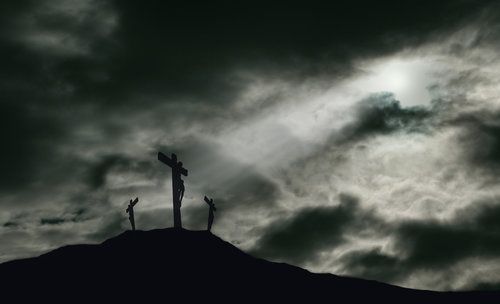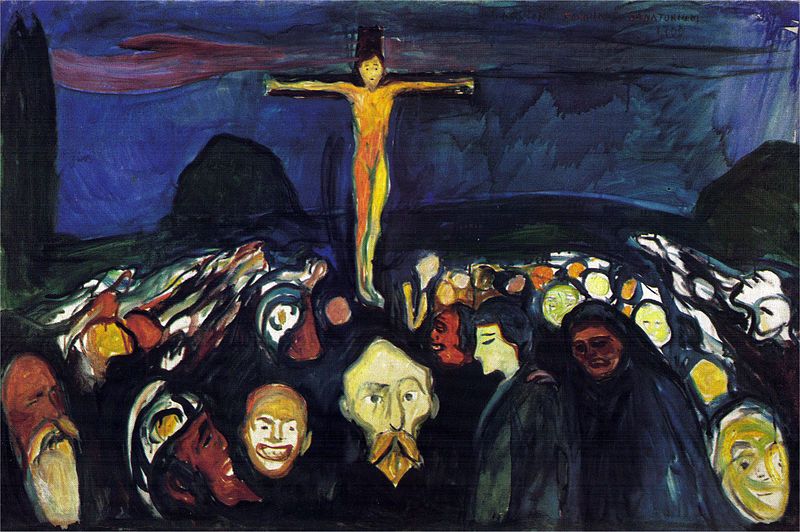
In Luke’s Gospel, several characters encounter Jesus on the road to “the place called the Skull.”
The journey starts with Peter, the fisherman who was the first to acknowledge Jesus as the Messiah. Peter is ready to take up the sword against Judas and the guard who come to arrest Jesus. Peter follows Jesus as far as the high priest’s courtyard, only to deny even knowing Jesus when he is confronted – by a young maid. May we hear the cock crow when we betray someone, when our actions are not up to our words, when our good intentions only go so far.
The governor Pilate hears the case against Jesus. Pilate is a Roman functionary, in constant fear of angering his Roman superiors. He knows that Jesus is being framed by the Jewish leadership. It’s a grave injustice and Pilate knows it. But defending Jesus is not the politically savvy thing to do here. May we find the courage that Pilate lacks to confront injustice by doing what is right and merciful regardless of the consequences.
Pilate’s guards then beat and abuse Jesus. Bullies exist in every place and time — thugs who have the tacit permission to inflict the cruelty that their bosses quietly sanction. May we call out the bullies we encounter and come to the defence of their victims — and may we be humble and self-aware enough to realize when we are the “bully.”
Poor Simon was coming home from the fields when soldiers pressed him into service to help the stumbling Jesus carry the crossbeam. You have to wonder: Did the Cyrenian balk at helping Jesus? Did he feel any pity for the condemned Jesus? May we be ready to help one another bear our crosses of illness, poverty, and grief that are unexpectedly laid on our shoulders.
As Jesus carries his cross through the streets of the city, he meets a group of women who are horrified at what is happening to Jesus. Perhaps they heard him teach; maybe he cured one of their loved ones. They can’t fathom why this is happening, but they’ve seen this before: a good man caught up with the ugly politics of Jerusalem. May we possess the compassion and mercy of the women of Jerusalem for the broken, the suffering and the abused in our own cities and towns.
Jesus is crucified between two criminals. One of them sees beyond his own tragic plight to recognize the injustice of Jesus’ death and the promise of God’s vindication. In the shadow of the cross, the “good thief” comes to grips with the failings of his life and, in his encounter with Jesus, is promised Paradise. May we realize in the shadow of the cross our own need for forgiveness and embrace the hope that forgiveness is ours.
And after Jesus “breathes his last,” Joseph, the council member who refused to go along with this travesty, steps forward to ask for Jesus’ body and arranges for a proper if hurried burial May we possess a faith that compels us to act with Joseph’s quiet integrity to step forward for the sake of justice and decency.
And the women in Jesus’ company watch and wait . . .

In each of these figures, we can see ourselves. In their role in Jesus’ passion, we realize the extent of our faith and the depth of our belief – and we understand the reality of God’s love in his Christ given up for us. In the events of Holy Week, God transforms the cruel and unjust death of his Son into the ultimate vindication of good over evil, of light over darkness, of life over death. Let our prayer this week be that God will give us the grace to overcome Pilate’s cowardice to embrace the integrity of Joseph of Arimathea, making Christ’s body our own; that we may seek not to melt into the crowd of onlookers but to become Simons of Cyrene, helping Jesus take up his cross, or one of the women of Jerusalem who offers Jesus a rag to wipe his face, a sip of water, the support of their tears; that we may possess the courage that Jesus’ disciples lack and the undeterred compassion of the women who come early in the morning to complete the burial of Christ. May we see ourselves in the shadows and movements of this Holy Week as we struggle to walk the way of the Crucified in the Gethsemanes and Golgothas of our own time and place.